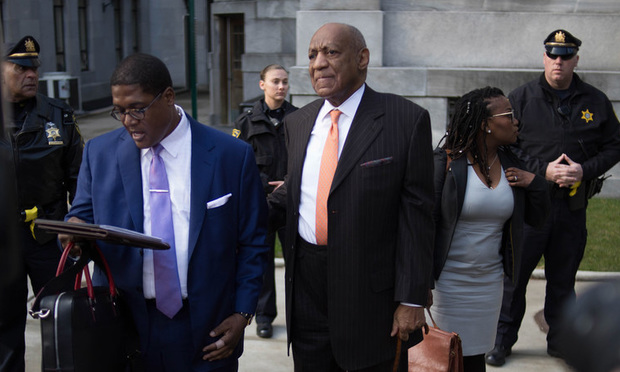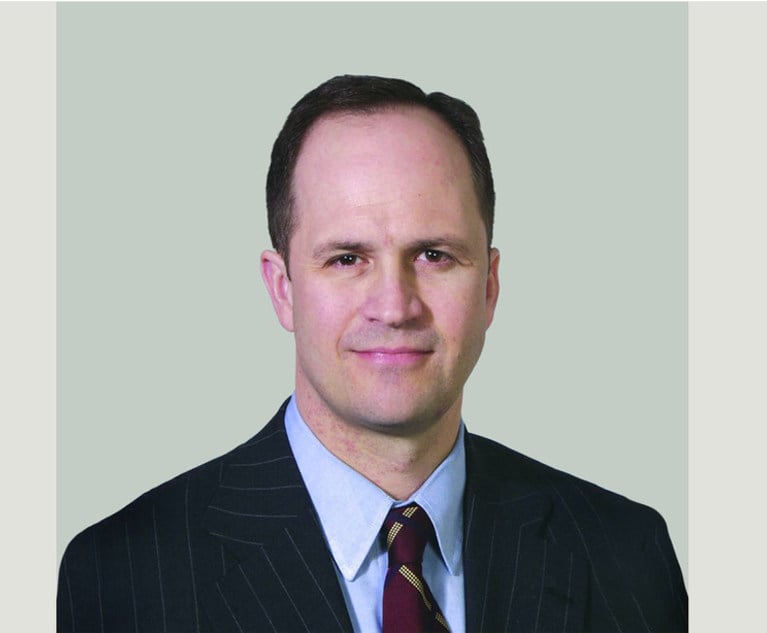Pa. Supreme Court Agrees to Hear Bill Cosby's Bid to Overturn Sexual Assault Conviction
The one-page order specifies that the justices will consider whether the trial court improperly admitted the testimony of several women who claimed Cosby sexually assaulted them decades ago.
June 23, 2020 at 01:51 PM
4 minute read
 Actor Bill Cosby, right, and spokesman Andrew Wyatt arrive for day 2 of Cosby's sexual assault retrial April 10, 2018, at the Montgomery County Courthouse in Norristown, Pennsylvania. Photo: Shutterstock
Actor Bill Cosby, right, and spokesman Andrew Wyatt arrive for day 2 of Cosby's sexual assault retrial April 10, 2018, at the Montgomery County Courthouse in Norristown, Pennsylvania. Photo: Shutterstock
The Pennsylvania Supreme Court has agreed to consider Bill Cosby's efforts to overturn the sexual assault trial that resulted in a lengthy sentence for the famed comedian.
The justices on Tuesday agreed to hear Cosby's appeal, granting allocatur on two issues the former TV star has raised throughout the criminal proceedings against him.
The one-page order specifies that the justices will consider whether the trial court improperly admitted the testimony of several women who claimed Cosby sexually assaulted them decades ago, and whether a purported agreement between Cosby and a former Montgomery County district attorney to not press charges against the comedian in 2005 barred a subsequent administration from prosecuting Cosby nearly a decade later.
In the spring of 2018, a Montgomery County jury found Cosby guilty of three counts of aggravated indecent assault, based on Andrea Constand's allegations that he sexually assaulted her in 2004. He was ultimately sentenced to three-to-10 years in state prison.
In December, a three-judge Superior Court panel denied Cosby's efforts to overturn that verdict, saying, in a 94-page opinion, that the comedian's sentence should stay in place.
Cosby's case raised unusual questions given the large number of additional accusers, and a purported nonprosecution agreement from when the allegations against him first surfaced. But the appellate court stood by the Montgomery County Court of Common Pleas' decisions on those issues.
A main focus of Cosby's appeal, among other arguments, was that the trial court erred in allowing five women who have accused him of sexual assault to testify at trial, in addition to Constand, whose allegations against him formed the basis of the criminal case. Cosby was found guilty of drugging Constand and sexually assaulting her at his home in 2004.
Another recurring issue in the prosecution, which is set to now come before the justices, stems from an alleged agreement he entered into with prosecutors more than a decade ago.
Shortly after the charges against him were filed, Cosby filed a petition for writ of habeas corpus, arguing that his attorneys in 2005 had an enforceable agreement with the District Attorney's Office that he would not be prosecuted in exchange for Cosby testifying in a related civil lawsuit. Bruce L. Castor Jr. was district attorney at that time, and he made a public announcement when his office chose not to bring charges against Cosby based on Constand's allegations.
Current District Attorney Kevin Steele reopened the case and brought charges after portions of the civil deposition Cosby gave in 2005 and 2006, in which Cosby admitted to giving a woman drugs in order to have sex with her, became public.
Castor testified at a hearing in February 2016 about that petition, and said he made a binding promise in 2005 that Cosby would not be prosecuted. But after two days of testimony and argument, Judge Steven T. O'Neill ruled in prosecutors' favor, denying Cosby's petition to have the charges dismissed. O'Neill's order said a credibility judgment was inherent in his ruling.
In addition to pointing to the agreement as part of his appeal, Cosby's defense team also cited it in an effort to recuse O'Neill from overseeing his sentencing.
In a statement to the press, Steele said, "The Pennsylvania Supreme Court has narrowed the issues on appeal, limiting them to prior bad acts and the sovereign edict. We look forward to briefing and arguing these issues and remain confident in the trial court and Superior Court's previous decisions."
Brian Perry of Perry Shore Weisenberger & Zemlock, who is representing Cosby, did not immediately returned a call seeking comment.
This content has been archived. It is available through our partners, LexisNexis® and Bloomberg Law.
To view this content, please continue to their sites.
Not a Lexis Subscriber?
Subscribe Now
Not a Bloomberg Law Subscriber?
Subscribe Now
NOT FOR REPRINT
© 2025 ALM Global, LLC, All Rights Reserved. Request academic re-use from www.copyright.com. All other uses, submit a request to [email protected]. For more information visit Asset & Logo Licensing.
You Might Like
View All
Ex-DLA Piper, Ballard Spahr Atty Accused of Aiding Video Game Company Founder's Misappropriation Scheme
5 minute read
From M&A to Music Fest, Ballard Spahr Attorney Hosts Week-Long Jam Session With Help of Clients
5 minute read
$43.5M Med Mal Verdict for Ex-Eagles Team Captain Withstands Appellate Challenge

Pa. Casinos Ask Court to Force State to Tax Skill Games Found in Stores Equally to Slots
3 minute readTrending Stories
- 1'It's Not Going to Be Pretty': PayPal, Capital One Face Novel Class Actions Over 'Poaching' Commissions Owed Influencers
- 211th Circuit Rejects Trump's Emergency Request as DOJ Prepares to Release Special Counsel's Final Report
- 3Supreme Court Takes Up Challenge to ACA Task Force
- 4'Tragedy of Unspeakable Proportions:' Could Edison, DWP, Face Lawsuits Over LA Wildfires?
- 5Meta Pulls Plug on DEI Programs
Who Got The Work
Michael G. Bongiorno, Andrew Scott Dulberg and Elizabeth E. Driscoll from Wilmer Cutler Pickering Hale and Dorr have stepped in to represent Symbotic Inc., an A.I.-enabled technology platform that focuses on increasing supply chain efficiency, and other defendants in a pending shareholder derivative lawsuit. The case, filed Oct. 2 in Massachusetts District Court by the Brown Law Firm on behalf of Stephen Austen, accuses certain officers and directors of misleading investors in regard to Symbotic's potential for margin growth by failing to disclose that the company was not equipped to timely deploy its systems or manage expenses through project delays. The case, assigned to U.S. District Judge Nathaniel M. Gorton, is 1:24-cv-12522, Austen v. Cohen et al.
Who Got The Work
Edmund Polubinski and Marie Killmond of Davis Polk & Wardwell have entered appearances for data platform software development company MongoDB and other defendants in a pending shareholder derivative lawsuit. The action, filed Oct. 7 in New York Southern District Court by the Brown Law Firm, accuses the company's directors and/or officers of falsely expressing confidence in the company’s restructuring of its sales incentive plan and downplaying the severity of decreases in its upfront commitments. The case is 1:24-cv-07594, Roy v. Ittycheria et al.
Who Got The Work
Amy O. Bruchs and Kurt F. Ellison of Michael Best & Friedrich have entered appearances for Epic Systems Corp. in a pending employment discrimination lawsuit. The suit was filed Sept. 7 in Wisconsin Western District Court by Levine Eisberner LLC and Siri & Glimstad on behalf of a project manager who claims that he was wrongfully terminated after applying for a religious exemption to the defendant's COVID-19 vaccine mandate. The case, assigned to U.S. Magistrate Judge Anita Marie Boor, is 3:24-cv-00630, Secker, Nathan v. Epic Systems Corporation.
Who Got The Work
David X. Sullivan, Thomas J. Finn and Gregory A. Hall from McCarter & English have entered appearances for Sunrun Installation Services in a pending civil rights lawsuit. The complaint was filed Sept. 4 in Connecticut District Court by attorney Robert M. Berke on behalf of former employee George Edward Steins, who was arrested and charged with employing an unregistered home improvement salesperson. The complaint alleges that had Sunrun informed the Connecticut Department of Consumer Protection that the plaintiff's employment had ended in 2017 and that he no longer held Sunrun's home improvement contractor license, he would not have been hit with charges, which were dismissed in May 2024. The case, assigned to U.S. District Judge Jeffrey A. Meyer, is 3:24-cv-01423, Steins v. Sunrun, Inc. et al.
Who Got The Work
Greenberg Traurig shareholder Joshua L. Raskin has entered an appearance for boohoo.com UK Ltd. in a pending patent infringement lawsuit. The suit, filed Sept. 3 in Texas Eastern District Court by Rozier Hardt McDonough on behalf of Alto Dynamics, asserts five patents related to an online shopping platform. The case, assigned to U.S. District Judge Rodney Gilstrap, is 2:24-cv-00719, Alto Dynamics, LLC v. boohoo.com UK Limited.
Featured Firms
Law Offices of Gary Martin Hays & Associates, P.C.
(470) 294-1674
Law Offices of Mark E. Salomone
(857) 444-6468
Smith & Hassler
(713) 739-1250





